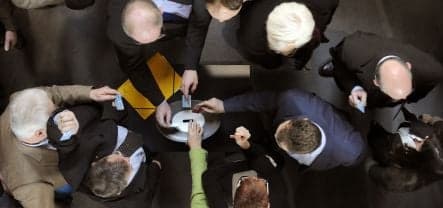Parliament approves record 2009 budget

After four days of tough debate, Germany’s lower house of parliament on Friday approved a record €290 billion budget for next year that was unanimously rejected by the country’s opposition parties.
The government will spend 2.4 percent more in 2009 than in 2008 and take on €18.5 billion in new debt as the world’s export champion struggles with the repercussions of a global economic slowdown.
Finance Minister Peer Steinbrück praised the budget as being on-target while rejecting calls for tax cuts to help re-ignite the economy. One has to be careful that “the interest noose we’ve got around our neck doesn’t keep growing,” he said. He also noted that tax cuts would have no effect for half of the country’s 47 million households since they pay no income tax.
The budget, developed by politicians from the ruling Social Democrat (SPD) and Christian Democrat (CDU) coaliation, was met with strong words by the country’s opposition parties.
Otto Fricke, head of the Bundestag’s budget committee and a member of the liberal Free Democrats (FDP), said 2009’s budget broke several records. “Never during this legislative period has a budget been so far from reality as this budget. It is purely a campaign budget,” Fricke said, referring to next September’s general election. His party’s budget expert, Ulrike Flach, said that the budget would become a “blemish” on the struggling job market in the coming weeks.
The hard-line socialist Left party demanded the coalition government launch an economic stimulus package equivalent to 1 percent of the country’s $2.6 trillion gross domestic product. It accused the government of mouthing empty clichés while swiftly launching a €560 billion rescue package for banks.
Anna Lührmann from the Greens accused the government of “lacking in seriousness” by ignoring €20 billion in potential risks related to the budget. She also pushed to have debt limits added to the country’s constitution to ensure that liabilities are paid down during economic upturns.
CDU budget expert Steffen Kampeter rejected the criticism and said the government is using the new debt to offset a shortfall in tax income related to the economic slowdown. However, Kampeter acknowledged that a budget alone couldn’t offset concerns sparked by the slowing economy.
“You can’t buy trust,” he said.
Environment minister Sigmar Gabriel (SPD) will have 67.5% more cash to give out next year as new CO2-related income flows into his account while transport minister Wolfgang Tiefensee (SPD) will have the biggest true increase with a total €2.3 billion more allotted to his ministry for 2009.
Comments
See Also
The government will spend 2.4 percent more in 2009 than in 2008 and take on €18.5 billion in new debt as the world’s export champion struggles with the repercussions of a global economic slowdown.
Finance Minister Peer Steinbrück praised the budget as being on-target while rejecting calls for tax cuts to help re-ignite the economy. One has to be careful that “the interest noose we’ve got around our neck doesn’t keep growing,” he said. He also noted that tax cuts would have no effect for half of the country’s 47 million households since they pay no income tax.
The budget, developed by politicians from the ruling Social Democrat (SPD) and Christian Democrat (CDU) coaliation, was met with strong words by the country’s opposition parties.
Otto Fricke, head of the Bundestag’s budget committee and a member of the liberal Free Democrats (FDP), said 2009’s budget broke several records. “Never during this legislative period has a budget been so far from reality as this budget. It is purely a campaign budget,” Fricke said, referring to next September’s general election. His party’s budget expert, Ulrike Flach, said that the budget would become a “blemish” on the struggling job market in the coming weeks.
The hard-line socialist Left party demanded the coalition government launch an economic stimulus package equivalent to 1 percent of the country’s $2.6 trillion gross domestic product. It accused the government of mouthing empty clichés while swiftly launching a €560 billion rescue package for banks.
Anna Lührmann from the Greens accused the government of “lacking in seriousness” by ignoring €20 billion in potential risks related to the budget. She also pushed to have debt limits added to the country’s constitution to ensure that liabilities are paid down during economic upturns.
CDU budget expert Steffen Kampeter rejected the criticism and said the government is using the new debt to offset a shortfall in tax income related to the economic slowdown. However, Kampeter acknowledged that a budget alone couldn’t offset concerns sparked by the slowing economy.
“You can’t buy trust,” he said.
Environment minister Sigmar Gabriel (SPD) will have 67.5% more cash to give out next year as new CO2-related income flows into his account while transport minister Wolfgang Tiefensee (SPD) will have the biggest true increase with a total €2.3 billion more allotted to his ministry for 2009.
Join the conversation in our comments section below. Share your own views and experience and if you have a question or suggestion for our journalists then email us at [email protected].
Please keep comments civil, constructive and on topic – and make sure to read our terms of use before getting involved.
Please log in here to leave a comment.